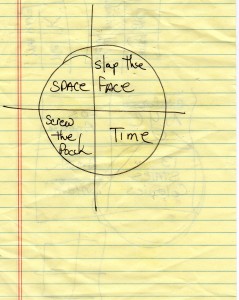
Here’s a short poem I finished up at 4 a.m. this morning, followed by some creative notes that you might find valuable in developing your own stories:
Glacier
Can I find some peace of mind,
to dull the horrid daily grind,
or should I taste the bitter rind,
whose poison quells all pain?
Will I fight another day,
am I the one my Id will slay,
and what will be the price to pay,
to end this sad refrain.
From time to time I am compelled,
to neuter what I cannot geld,
that which never can be held,
melting in the rain.
Driven by the summer breeze,
to dash against the leafless trees,
then thrust to ground on brittle knees,
and never walk again.
Lifeless dreams through sightless eyes,
dance across the heartless skies,
and sing a ghastly last reprise,
that burns into my brain.
Empty husk of parasites,
humbled by a thousand bites,
drained of self and filled with mites,
resistance is in vain.
Flaccid with my stuffing gone,
darkness now defies the dawn,
time stands still, then marches on,
a pointless trackless train.
Into earth my substance crumbles,
while the time train clacks and rumbles,
all I was is lost to mumbles,
neither sharp nor sane.
Now as if I wasn’t there,
self is shadow, breath is air,
nothing left to be aware,
a terminal moraine.
CREATIVE NOTES:
So, you see, it is about the death of a glacier. But the weird part is, I didn’t know that until after I wrote it.
All through the creative process I thought I was describing a despondent burned-out person, though I, myself, am in quite a positive mood of late.
It felt strange writing this – different than usual. Each stanza came together organically, and though each was about the same issue of loss of self, each was also centered around a completely different kind of imagery.
The stanzas really didn’t seem connected by a central spine or theme, just that sense of loss of self. In fact, taken together, I felt they were just chaotic glimpses into the storyteller’s psyche.
In terms of the creative process, all went smoothly until I arrived at the very last line. After every previous rhyme falling easily into place, I couldn’t (for the life of me) figure out how I wanted it to end.
So, for the first time on this project, I opened the rhyming dictionary and scanned through hundreds of multi-syllable words that rhymed with “pain.”
Nothing jumped out at me until I stumbled across “terminal moraine.” That was it! Perfect ending – terminal having the double meaning of mortality, which seemed to fit with this poor narrators description of his life experiences.
So, I plopped in that last line, re-read it a few times and published it on my blog under the title “A Way Out,” still believing it to be about this person.
Didn’t like the title though. Seemed mamby pamby. I decided to re-read the poem a few more times and after perhaps half a dozen readings, going from the end back to the beginning, I read “terminal moraine” immediately followed by “daily grind.” And that’s when it hit me – those two phrases sound like they are describing a glacier!
“No….” I thought. “It can’t be….” So I read it once more with “death of a glacier” in mind and holy crap! Every stanza – every WORD rang true to that theme, as if it had been intentionally written all along to describe the last days of a glacier’s life.
Now that has never happened to me before, and I’m kind of blown away by it. The poem is good and the imagery works with any title, but “Glacier” is that missing thread that elevates the poem from a collection of images to a single topic, explored.
I’d say at least half of the artistic impact of the poem derives from seeing it as the end of a glacier. And so, I really don’t feel right taking credit for that since that didn’t happen until the poem was already completed. Hence, this “apology” for the quality of the work.
Still, this brings up an interesting aspect of the writing craft. I’ pretty sure my subconscious knew full well what it was writing about from the get-go. It just didn’t fill me in on it until the end.
I’e read many accounts where readers find so much meaning in a poem, a story, or a song that was never intended by the author, who denies that meaning intently.
And yet, as creators, we all know we have over-active imaginations, and a lot of what goes on with that comes from the subconscious. That’s where inspirations come from and it is the source of those moment of epiphany that pop up in Eureka moments.
It is my belief that the truly great writers are those whose subconscious works to instill far more meaning in their stories than that of which the author is ever consciously aware. THAT is the quality that infuses depth and complexity into the piece and draws the readers into a multi-level multi-faceted experience.
This latest effort has driven that home to me yet again – that the best way to construct a story is to let your mind set the destination and your heart chart the course.
Melanie Anne Phillips
Creator, StoryWeaver



